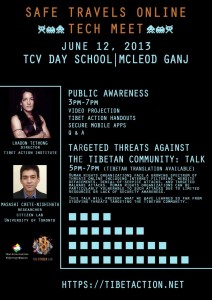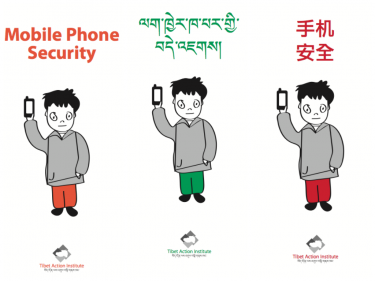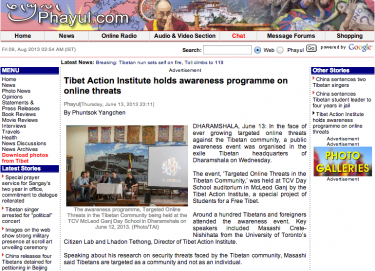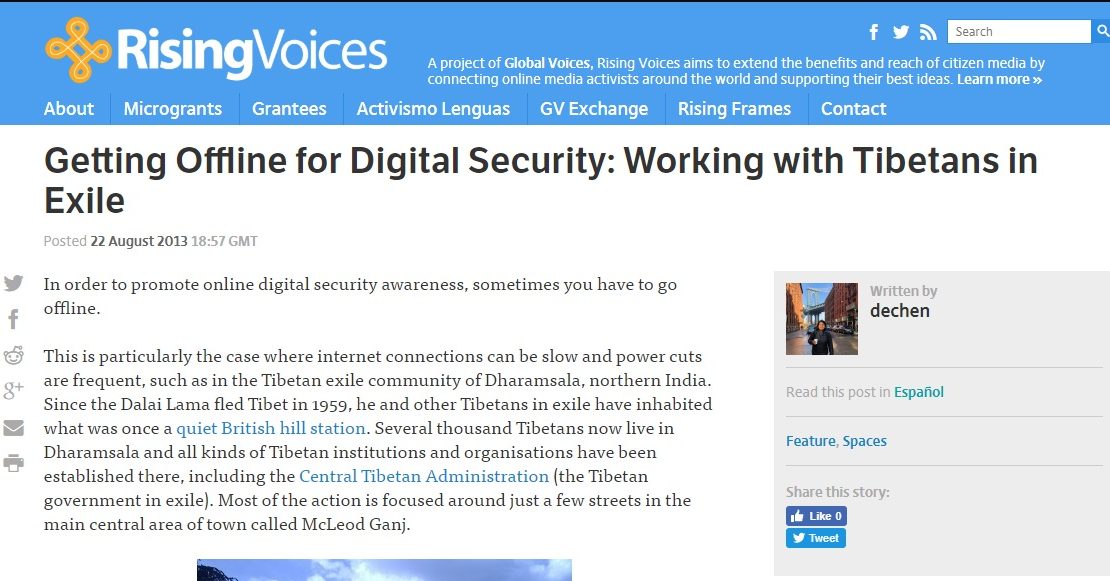Getting Offline for Digital Security: Working with Tibetans in Exile
In order to promote online digital security awareness, sometimes you have to go offline.
This is particularly the case where internet connections can be slow and power cuts are frequent, such as in the Tibetan exile community of Dharamsala, northern India. Since the Dalai Lama fled Tibet in 1959, he and other Tibetans in exile have inhabited what was once a quiet British hill station. Several thousand Tibetans now live in Dharamsala and all kinds of Tibetan institutions and organisations have been established there, including the Central Tibetan Administration (the Tibetan government in exile). Most of the action is focused around just a few streets in the main central area of town called McLeod Ganj.

View of Dharamsala. Photo by Dechen Pemba
This is how Tibetan writer and poet Tenzin Tsundue describes the atmosphere in a short story titled “Kora (Full Circle)”: “the mass of different wares on sale, the cosmopolitan crowd, names of shops in English, Hindi, Tibetan, Punjabi, Tibetan music in the background as well as the natural sounds of a bustling small town…” It’s certainly a bustling place, so where better for the Tibet Action Insititute to hold a public awareness event and tech meet focusing on their “Safe Travels Online”campaign?

The need for concern about digital security amongst Tibetans inside Tibet and also those in exile is great. In addition to pervasive surveillance and monitoring of communications in Tibet, Tibetans in exile are also frequently targeted and vulnerable to attacks on their websites, social networks, emails and smartphone apps.
According to its website:
“Tibet Action Institute help Tibetans defend against China’s malicious cyber attacks and promote safer and more secure communications between all Tibetans”.
This means making resources available online, as well as in person.
In a recent article published in The Telegraph, Tibet Action Institute’s Lobsang Sither was quoted as saying, “We are focusing on basic online hygiene to teach Tibetans not to click on attachments or downloads, to use secure email protocols… Tibetans [in exile] are connected to other Tibetans in Tibet, so if they [China] can access our emails, they can track down Tibetans sharing information”.

Mobile Security Leaflets in English, Tibetan and Chinese from Tibet Action Institute
For the event that took place on June 12, 2013, in the hall of the Tibetan Children’s Village Day School in McLeod Ganj, Tibet Action Institute relied on a savvy combination of online and offline components to spread the word and create a buzz. In addition to the usual online methods of creating Facebook pages and updates about the event, Students for a Free Tibet India (SFT) also publicised the event with the old-fashioned method of combining paper with people power. 100 large posters were printed and pasted around town by volunteers and 500 smaller flyers were also handed out in the days leading up to the event.
Perhaps the most novel offline method employed with which to spread the word was the use of the trusted activist’s tool, the megaphone. Dharamsala has “announcers” whose services can be hired – a human notice board whose job it is to visit each part of the local community with a megaphone to announce special events. Here, a local “Announcer” was hired to walk around Dharamsala the morning of the event to tell the community about the event. A tireless team of SFT volunteers also took to the megaphone in the afternoon, standing on the road outside the venue and making the occasional rounds, reading out the programme and encouraging anyone within earshot to drop by the venue!
Local Tibetans picking up leaflets about digital securty (the faces have been deliberately blurred)
Over a hundred local Tibetans and visitors attended the public awareness event and over the course of several hours in the afternoon, printed leaflets and materials about digital security were available in Tibetan, English and Chinese languages. Stickers and badges were also handed out to the guests and some had brought their phones, tablets and computers for a security check and advice. The main speakers were Lhadon Tethong, Director of Tibet Action Institute and Masashi Crete-Nishihata from the University of Toronto’s Citizen Lab, whose group has published several reports on malware targeting the Tibetan community.

Badges about mobile phone security
Whilst those materials were available in physical form, Tibet Action Institute’s staff member in Dharamsala, Lobsang Gyatso Sither, set up a local server in the venue that wasn’t dependent on internet. With the network name and password displayed on a big screen, guests could access all the online resources such as public awareness videos created by Tibet Action Institute, electronic copies of the printed materials as well as a number of secure apps for download. The public awareness videos were also shown on a loop at the venue, the humorous aspect of the videos were appreciated alongside the important and basic educative messages they were transmitting such as not to click on links or attachments in emails.

A screenshot about the event from Phayul.Com
Although the event was relatively small, it received a lot of attention from Tibetan media, such as Phayul.Com, the most widely-read Tibetan online portal in English. Online reports such as these and on Tibetan-language radio stations Radio Free Asia, Voice of America and Voice of Tibet have the power to reach Tibetans all over the world and, most importantly, to reach beyond the Great Firewall and the Himalayas, back to the Tibetans inside Tibet.
Dechen Pemba is a Global Voices author and has advised Tibet Action Institute on education programs.



